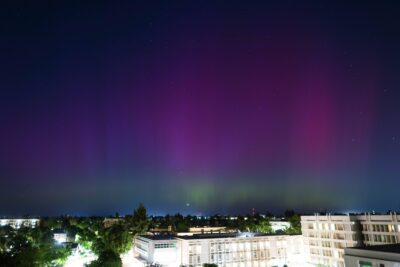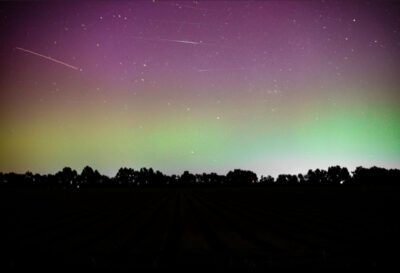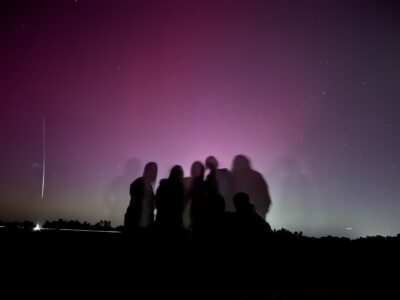One student describes her experience of checking off a bucket list experience on her college campus
BY SONORA SLATER — science@theaggie.org
The UC Davis Physics and Astronomy Club’s rooftop public viewing on Friday, May 10 was supposed to end around 10:30 p.m. But first-year biomedical engineering major Marin Cantrell had heard a rumor that there was a small chance the northern lights would be visible later that night — so she asked the organizers to stick around a little longer.
Needless to say, it paid off.
“I was sitting there and talking, and then somebody just yells around 11:30, ‘Oh my God, we can see it!” Cantrell said.
She jumped up, ran over to the ledge on the north end of the building, and eagerly looked out into the dark sky. She was rewarded with the sight of the pillars of light and pink and green spots that marked the phenomenon.

“People always say, like, ‘It felt like I was in a dream,’ but I’d never actually felt that before,” Cantrell said. “And then I stepped back for a second. And I was looking around at all these people and I was looking at the sky, and you can see bits of color. I look at all of this, and I get this really weird feeling that I’m going to wake up any second now. Like this is a hallucination. Like this cannot possibly be happening to me, this cannot possibly be real.”
The northern lights, otherwise known as the aurora borealis, can usually only be seen close to the north pole. It’s caused by eruptions of radiation called solar flares on the sun’s surface, hitting the Earth’s atmosphere with particles that excite gasses in the atmosphere and make them glow in shades of pink, purple, green and more.
This year, however, the sun is at the peak of its 11-year activity cycle — contributing to a historic geomagnetic storm that allowed viewers as far south as Texas, Georgia and (of course) Davis to see the stunning display. For many, this was a fulfillment of a bucket list goal: one that they didn’t expect to come true in their own backyard.
“I’ve wanted to see the northern lights for a really really long time,” Cantrell said. “My family wants to see them as well. We were probably eventually going to travel somewhere to see them. But I never thought that I would be able to see them without even having to leave California.”

So… how did the experience compare with seeing the lights in, say, Iceland? Well for one thing, the lights are visible closer to the horizon, rather than up above. And for another, the colors are significantly less vibrant to the naked eye. But with a phone camera on long exposure, the streaks of light are captured much clearer.
“You can see pink and green very vaguely in the sky,” Cantrell said. “But you can’t see much with your naked eye, [which is] true for a lot of astrophotography. It’s not [the same as] what you see on the camera, but being able to see it in person with your own eyes is so cool.”
The event was certainly unexpected for a lot of people — in fact, social media feeds the next day were flooded in near equal measure with pictures of the aurora, and those lamenting going to bed early and sleeping through it unaware.
“One of my friends actually texted his roommate [about the aurora], and his roommate was like, ‘That’s what your photos are for,” Cantrell said. “He did not want to get out of bed. I’m like, you’re insane for that.”
In general, Cantrell said it felt like a community affair, as everyone texted their friends to go outside and look up, and more and more people joined the party on the rooftop.

“We were all taking pictures and just being like, ‘We’re really glad that we were here,’ Cantrell said. “We were really glad to be able to experience that. That moment was a really special once in a lifetime thing.”
Written by: Sonora Slater — science@theaggie.org




